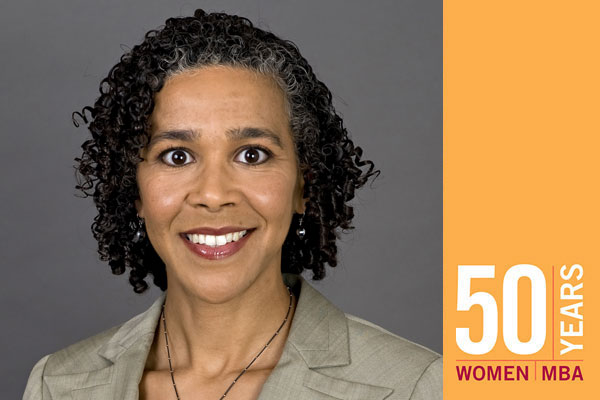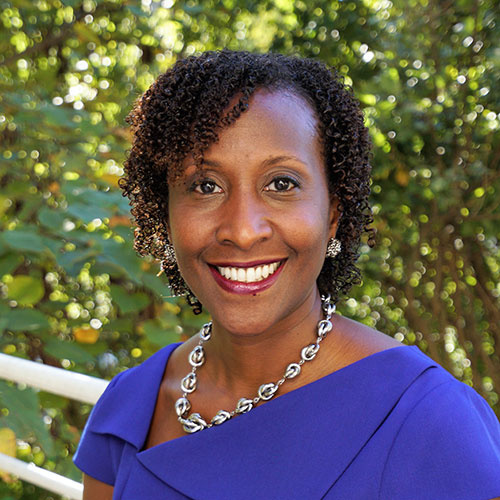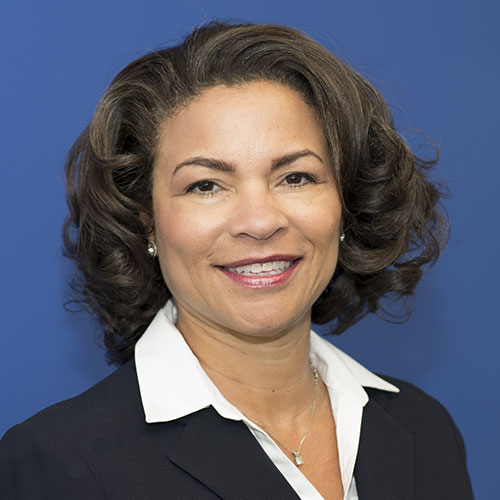
Sara Crutchfield Clarke
Biography
Sara Clarke is senior vice president of corporate strategy, analysis, and collaboration at Showtime Networks Inc. (SNI). She leads analysis and strategic recommendations that have helped SNI sustain subscriber growth and exceed its performance targets. Her team applies technology-driven solutions to increase the flow of information and ideas throughout the organization. Sara designed and executes an annual Intern Group Project Program which generates innovative proposals aligned with SNI's growth objectives.
How did being Black and a woman shape your experience at HBS and thereafter?
In different ways, my parents both taught me to believe in myself and my potential. I had a Caucasian mom who was only a high school graduate, but she was brilliant—she just didn't go to college because her family didn't have the means. But she was self-educated—very culturally aware and politically active. And then I have an African American dad [Phil Crutchfield, MBA 1971] who went to HBS and served in the Air Force. Growing up in separate worlds, they both had ambitions and desires to advance, to see the world, and to connect with people.
They told me, "We love you. We believe in you. You can be and do whatever you'd like. But people are going to judge you no matter what. So your best has to be better than everyone else's." I think that message became part of my own inner mission statement: That I wanted to be the best I could be, make my parents proud, and prove to others that I deserved to be where I was-to not be judged as a token.
Growing up as a biracial kid, I kind of got it from both sides. When my mom picked me up from school, the black kids would ask, "Is that your mother? Are you adopted?" and I couldn't even fathom why they wouldn't understand that of course that's my mother. The white kids who I was friendly with would say, "Oh, by the way, we can't really date because my parents wouldn't approve." Those are the social speed bumps that can give you a weird, funhouse-mirror view of yourself; it took some time for me to see myself clearly.
I always knew that education was important; thanks to the organization A Better Chance, which provides scholarships for students of color to attend college prep schools, I was able to go to the Middlesex School in Concord, Massachusetts. It was a topnotch education, which compensated for some of the social isolation I felt as the only African American student in the entire school the first year I attended. When I got to Brown University as an undergraduate, it was heaven. I saw people like me. I saw people who weren't like me. It was the best environment to grow into a stronger, more complete sense of myself. But with HBS, the best was to come. I made the decision to apply because I felt I'd hit a plateau in my position at Showtime—that if I really wanted to make that next leap, I needed to throw myself into a challenging, full-time learning experience. It was truly everything I'd hoped for and more—over time, the leadership and organizational behavior lessons have only grown in their relevance and value as I've matured as a manager and weathered a range of organizational shifts. Becoming attuned to how people think, feel, and interact in work environments has proven every bit as valuable as applying analytical skills and effective general management.
One of the best experiences I had during my time as a student was chairing the 25th anniversary of the H. Naylor Fitzhugh Conference. I believe the African American Student Union is an organization that we need now more than ever in today's political climate. We need to help each other. We need to hire each other. We need to learn from each other. We need to support each other. The fact that AASU was part of my father's experience when he was at HBS, and that it continues to serve a meaningful purpose, is something I'm proud of and want to celebrate.
I can't really think about my career without considering the powerful effect of the mentors I've had; in the same way, I feel passionately about being a "mentoring multiplier" in terms of directly assisting others and encouraging others to lend their own expertise.
At Showtime, I don't feel conspicuous. I think I've earned our leadership team's respect. But I do have a memory of taking a client to lunch with my boss and another senior-level executive from Showtime. It was following a long, and successful, effort on my part to increase our representation with a cable provider. This particular client said, "Sara's been very gracious, and she's so articulate." It was one of those weird, backhanded compliments. I felt I had worked hard, and been so professional, creative, and resourceful—and he was complimenting me for stringing a sentence together. That made me resolve to work even harder and do more to prove to him that I'm the best account manager he's ever had.
My advice to young black women attending HBS is to stay true to yourself, even when it leads to decisions that are contrary to what others may choose for themselves. In the face of rapid change and an unpredictable future, the depth of your self-knowledge will keep you on course. Also, a lot of us carry around a little inner critic who is always talking us down. Don't worry, other people will talk you down! Don't do it to yourself.

